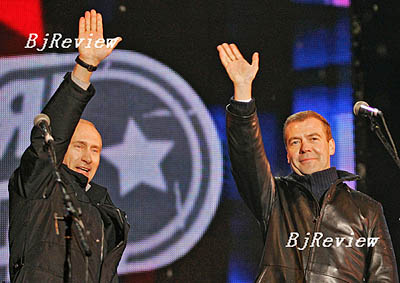|

Dmitry Medvedev's landslide victory in Russia's presidential election on March 2 came as expected. When the country's Central Election Commission announced the voting result the next day, Medvedev had won 70.23 percent of the ballots and his approval rating hit a historical high of 79 percent. In this respect, he managed to outshine current President Vladimir Putin, who had garnered 71.3 percent of popular support when he won his second term in 2004.
Chinese international affairs experts point out that Medvedev's victory was also a victory for Putin and the United Russia Party. As Putin's appointed successor, Medvedev inevitably will continue the current policies as he promised to do prior to the election. But he will face specific challenges in several areas, they said.
In an interview with Xinhua News Agency, Wan Chengcai, a researcher from the Development Research Center of the State Council, cited five reasons for Medvedev's high voter support.
First, he was the candidate jointly endorsed by four Russian political parties-the United Russia, the Just Russia, the Agrarian Party and Civil Force. Together, they won 75.39 percent of votes in the Duma election held in December 2007. Second, Putin, who has worked with Medvedev for the past 17 years, firmly backs him and publicly said Medvedev would be "a good president." Third, as Russia's first deputy prime minister, Medvedev has made his contribtutions to the improvement in the country's education, sanitation, housing and agriculture. Because these areas are closely connected to people's lives, Medvedev easily won over voters. Fourth, a huge amount of media exposure also helped Medvedev enhance his popularity. Last, the blueprint that Putin and Medvedev laid out before the election, which described the country's bright future during the next 12 years, and a four-year economic development plan encouraged Russians to support Medvedev, Wang said.
He also noted that Russians now are benefiting from the rapid development of their country over the last years and are hoping to sustain stable development under Medvedev as president and Putin as prime minister.
Missions and challenges
On March 3, Medvedev held a press conference after his victory was confirmed. He said he would maintain a "comrade-like partnership" with Putin and continue Putin's policies on domestic and foreign affairs. He also said he would further protect state interests and insist on independent diplomatic strategies, while strengthening relationships inside the Commonwealth of Independent States.
At the press conference, Medvedev also talked about the four major missions of his government-building administrative institutions, modernizing the country's infrastructure, pushing scientific and technological innovation and increasing investment in the country. Medvedev said his government would reduce the number of governmental officials on the boards of directors at state-owned enterprises and let professionals manage those companies. He also said Russia should set up a modern tax system to standardize its tax policy, simplify the tax system and help small-scale enterprises grow. Medvedev, who majored in law in college, also stressed that his government would work on strengthening the country's legislative system and combating corruption. Medvedev previously said on several occasions that he also wanted to decrease the country's dependence on energy resources and diversify its economic structure.
Wan said Medvedev's four missions came from a specific version of a development strategy that Putin announced on February 8. According to Putin's plan, Russia would become the biggest economy in Europe and the fifth largest in the world with its total gross domestic product (GDP) exceeding $5 trillion-almost four times of its current number. He also said he hoped the country's rising middle class eventually would comprise 60 percent-70 percent of the total population. Putin's plan also included creating a modern economic structure and building a strong military.
Although Medvedev has mapped out a bright future for Russia, he has big challenges ahead of him, Chinese observers said. In an article for the Shanghai-based journal Jiefang Daily, Hu Jian, Deputy Director of the Center for Russian Studies at the Shanghai Academy of Social Sciences, pointed out that even though Medvedev has promised that the power distribution between the president and prime minister would not change, Putin, who had been a hard-line president, would play a leading role in running the country during the next two years or longer. Hu said if the two leaders reached a point where they could no longer tolerate their power-sharing arrangement, the alliance would break up.
But Hu said it would not be easy for Medvedev to fine-tune the country's economic structure, his most important task among promoting Russia's sustainable development. Energy resources such as oil and natural gas constitute a great part of the country's economy because of rising energy prices around the world. But decreasing Russia's dependence on energy resources would be a hard task for Medvedev, Hu said.
As Medvedev continues Putin's diplomatic policies, he must be very skillful in dealing with the West, Hu said. Protecting Russia's dignity as a big country and avoiding confrontations with Western countries will prove a hard test to Medvedev's political wisdom and mettle, he added. | 